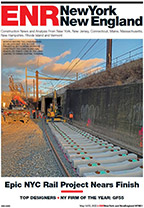

In six terse sentences following two months of testimony and technical detail, a state court judge in Manhattan cleared crane owner James F. Lomma of all charges related to a 2008 tower crane collapse in New York City that killed a crane operator and a sewer worker.
Family members and friends of the dead workers, packed into a tiny courtroom, remained silent as Judge Daniel Conviser declared Lomma not guilty of all six of the counts that included second degree manslaughter, criminally negligent homicide and reckless endangerment.
The verdict represents the third failed high-profile prosecution related to deadly construction accidents in the last 24 months as judges and juries seem reluctant to assign blame to individuals when causes are unclear and the complexity of construction work is explored.
Case Brought Scrutiny
Conviser declined to explain his reasoning, but he ruled that the court proceedings and evidence should all be unsealed because of its potential to improve crane safety. The case brought nationwide attention to safety standards around critical crane repairs, maintenance and operations. Lomma had faced a possible long prison sentence and substantial financial penalties.
The verdicts seemed to hold off the hope that construction jobsite safety in New York City could be enforced through criminal prosecutions against contractors. The Manhattan district attorney had portrayed Lomma, whose companies own hundreds of cranes used in the New York City area, as a greedy businessman who cut corners on safety by outsourcing a replacement to the crane’s cracked turntable to China rather than using more established suppliers in the U.S.
Prosecutors portrayed the cracked turntable and its improper repair as the most likely cause of the accident.
“Although we are disappointed with the judge’s verdict, each case we have brought in this area has put increased scrutiny on the construction industry as a whole, and has had a cascading effect on safety practices,” said Manhattan District Attorney Cyrus R. Vance Jr. in a statement. "Construction companies must do everything in their power to protect the safety of workers and the thousands of New Yorkers who live near or walk by a construction site every day. The tragic deaths of two young men in this case showed the serious and fatal consequences that can result when profit is put ahead of safety.”
'No Justice'
Standing outside the court building minutes after the verdicts, family members and attorneys for the families of crane operator Donald Leo and sewer worker Ramadan Kurtaj denounced the verdict. “I’m very disappointed because there’s no justice here,” says Susan Carten, attorney for the Kurtaj family.
“Who collects for this?” asked Donald Leo’s mother, Maria. “Not my son, who’s been blamed for this and can’t defend himself.”
Throughout the trial, prosecutors argued that Lomma employee and mechanic Tibor Varganyi ineptly handled the replacement of the crane’s turntable with a part from a Chinese manufacturer to save time and money. The prosecution claimed the failure of the replacement part caused the crane’s collapse and that Lomma tried to hide that fact by trying to corrupt a public official.
In October, Varganyi pleaded guilty to criminally negligent homicide for failing to perceive the danger in the condition of the cracked turntable and agreed to testify for the prosecution against his former boss.
The crane that collapsed, manufactured by Kodiak, had needed repairs to its bearings in 2007 when it was under Varganyi’s care, he admitted in his plea agreement.
Civil Lawsuits Continue
Both families have filed lawsuits against Lomma in state court seeking civil damages. The civil case is now in the discovery stage and the end of the criminal trial clears the way for Lomma to be deposed, says Bernadette Panzella, an attorney for the Leo family. “We’re going to put Mr. Lomma before a jury,” she said.
“This verdict says nobody’s safe as long as Lomma’s cranes are out there,” she added.
Lomma could not be reached for comment, but his attorneys had argued that Leo likely made a fatal mistake.
A key defense witness, forensic engineer Jim Wiethorn, testified in court that the actions of the deceased crane operator, not the turntable, was the root cause of the accident. The operator two-blocked the machine, causing critical damage that compromised the rig’s structural integrity, he testified.
A two-block occurs when the hook block contacts the boom tip. Wiethorn works at Haag Engineering, Sugar Land, Texas, which has investigated more than 700 crane accidents.
'Not A Greedy Guy'






_ENRready.jpg?height=200&t=1732204916&width=200)

